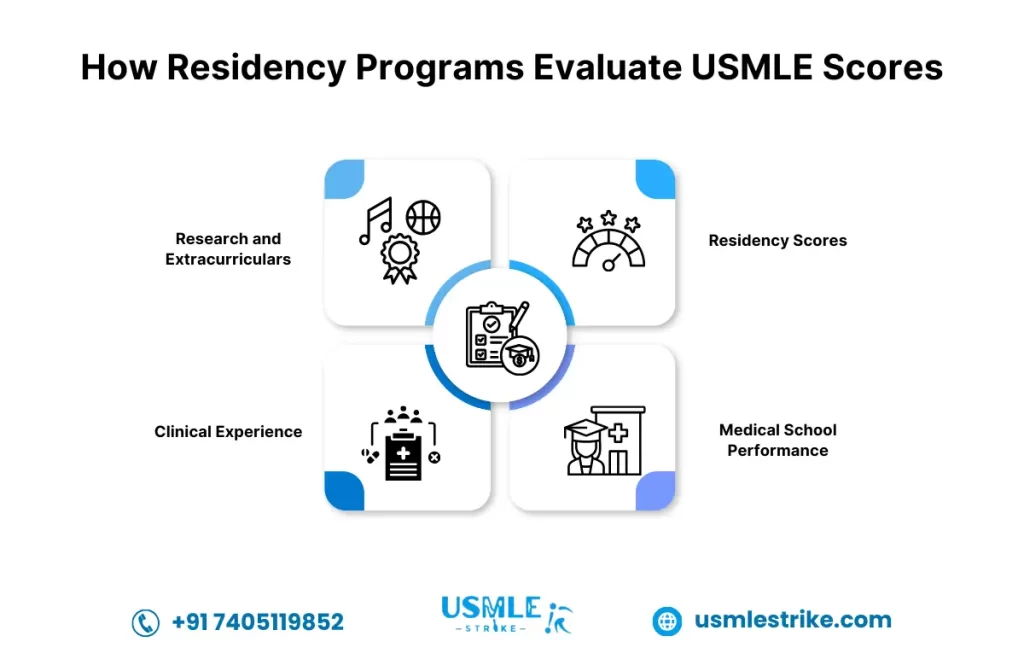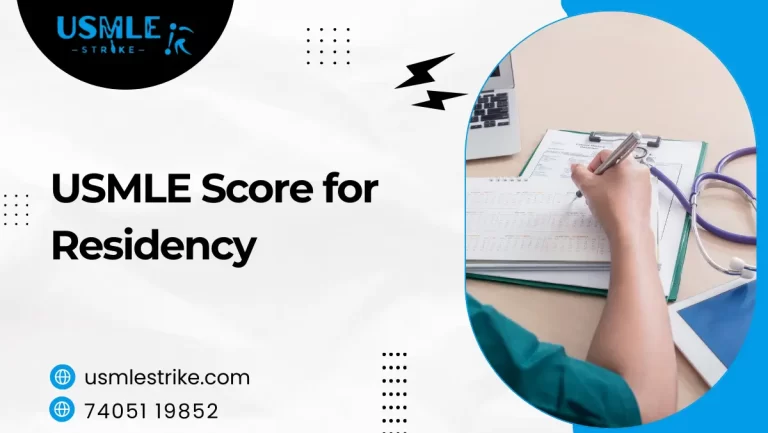USMLE score for residency plays a critical role in securing a medical residency program in the United States. Every aspiring doctor dreams of achieving a competitive score, as it directly impacts their chances of matching into their desired specialty. The process may seem overwhelming, but understanding the significance of each exam can make a difference.
USMLE Strike believes that students should strategically prepare for the exams, focusing on both knowledge and test-taking skills. Residency programs use these scores to evaluate applicants’ potential and dedication. But with Step 1 now being pass/fail, how does this change the importance of Step 2 CK? Let’s explore how USMLE score for residency impacts your future and what strategies can help you achieve success.
Purpose of USMLE Step 1 and Step 2 CK
The USMLE Step 1 and Step 2 CK serve different purposes in evaluating medical students:
- USMLE Step 1: This exam used to be the primary metric to assess a student’s ability to understand basic medical sciences. Now, with its pass/fail status, its influence on residency evaluations has changed.
- USMLE Step 2 CK: This is a clinical knowledge-based exam that assesses a student’s ability to apply medical knowledge in a real-world setting. Since Step 1 is now pass/fail, Step 2 CK has become the most important factor in USMLE score for residency.
Many students are now shifting their focus towards Step 2 CK to ensure they achieve high residency scores and strengthen their applications.
Impact of Step 1 Becoming Pass/Fail
With Step 1 now being pass/fail, residency programs are relying more on Step 2 CK scores:
- Less pressure on Step 1: Students no longer need to score highly on Step 1 to match into competitive specialties. However, passing on the first attempt is still essential.
- Greater emphasis on Step 2 CK: Since Step 1 no longer differentiates applicants, what is a good USMLE Step 2 score has become a common question. A high score can set you apart.
- Other application factors matter more: Clinical experience, letters of recommendation, and personal statements carry more weight than before.
Residency programs now heavily scrutinize Step 2 CK to gauge applicants’ readiness and competence.
Which Exam Matters More: Step 1 or Step 2 CK?
With the changes in Step 1 scoring, Step 2 CK is now the most important exam for residency assessments.
- Step 1: It is still a requirement, but a pass is enough.
- Step 2 CK: This score determines an applicant’s competitiveness. A strong Step 2 CK score answers the crucial question: what is a good USMLE Step 2 score?
- Specialty-specific importance: Some fields, like dermatology and radiology, used to rely heavily on Step 1 scores. Now, Step 2 CK is more important than ever for these specialties.
Scoring well on Step 2 CK is now the key to strengthening your USMLE score for residency.
Should You Take USMLE Step 2 CK or Step 1 First?
Medical students often wonder which exam to take first. The decision should be based on individual readiness and curriculum structure:
- Take Step 1 first: If your school requires Step 1 before clinical rotations, this is the only choice.
- Take Step 2 CK first: If you are confident in your clinical knowledge and want to submit a strong residency application, taking Step 2 CK first can be advantageous.
- Strategic approach: Since residency evaluations heavily depend on Step 2 CK, some students take Step 2 CK while preparing for Step 1 simultaneously.
Assessing your strengths and planning accordingly can give you an edge in achieving a strong USMLE score for residency.

Who Is Eligible to Take the USMLE Step 2 CK?
To be eligible for Step 2 CK, candidates must:
- Be enrolled in or have graduated from an accredited medical school.
- Have completed clinical rotations or clerkships.
- Be registered with the Educational Commission for Foreign Medical Graduates (ECFMG) if they are international medical graduates.
Understanding these eligibility requirements helps students plan their testing schedules to align with residency application timelines.
What Is the Passing Score for the USMLE Step 2 CK?
The passing score for Step 2 CK is determined by the National Board of Medical Examiners (NBME). As of recent updates:
- The passing score is 214.
- Competitive residency programs prefer scores above 240.
- What is a good USMLE Step 2 score? Generally, 250+ is considered excellent.
Achieving a high Step 2 CK score significantly improves your USMLE score for residency.
How Residency Programs Evaluate USMLE Scores
Residency programs use a holistic approach to assess applicants:
- Residency Scores: High USMLE scores can make a strong impression.
- Medical School Performance: Strong grades add to a competitive profile.
- Research and Extracurriculars: Publications and leadership roles enhance applications.
A strong residency scores for matching is crucial, but a well-rounded profile ensures success
What Is a Good USMLE Step 2 CK Score?
A good Step 2 CK score varies by specialty:
- 250+: Competitive for top programs.
- 240-249: Strong score.
- 230-239: Average.
- Below 230: May need additional application strengths.
Knowing what is a good USMLE Step 2 score can help students set realistic goals.
Improving Your Step 2 CK Score
To improve your Step 2 CK score:
- Use high-yield study materials: UWorld, NBME self-assessments, and First Aid are crucial.
- Practice time management: Simulated exams help with pacing.
- Identify weaknesses: Target weak areas with focused studying.
A strong USMLE score for residency increases chances of matching into desired programs.
Conclusion
USMLE score for residency is a crucial factor in securing a competitive residency match. With Step 1 now pass/fail, Step 2 CK has taken center stage. Understanding what is a good USMLE Step 2 score and how residency assessments impact your application can help you strategize effectively.USMLE Strike believes that success comes from preparation, strategic studying, and perseverance. If you’re aiming for a top-tier residency, focus on achieving a high USMLE score for residency and strengthening other aspects of your application.
Check out our new update on Our YouTube channel!





